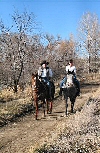OPEN SPACE
Fight the right enemy on land
This is in response to Patrick Murphy's recent letter regarding off-trail permits (Open Forum, March 22).
First of all, I am sorry to see that Mr. Murphy has to resort to name-calling. By calling those who would enjoy the careful use of our open space "wreck-reationists," he is using tactics that have been used for millennia by groups dismissive of those that don't agree with them, while attempting to discredit them and cower them into submission. Not a good example, I believe, for one who supposedly considers himself an environmentalist.
Regarding his example of tracks left behind by wagon trains a hundred or so years ago, his argument misses the point in a number of ways. First, there is a big difference between "impact" and "damage." Those wagon tracks have done nothing to change the ecosystem around them, have not caused species to go extinct, or any other collateral damage. Also, even in terms of impact, the weight per square inch of those wagon wheel tracks is multitudes higher than that of a human being.
The greatest danger to our open space lands originally came from development. That danger has been eliminated by purchasing those lands. The main concern now, which is actually causing damage to the ecosystem, comes from air pollution, the same air pollution that is caused by Mr. Murphy's car and the energy to heat his house, etc. This is having a major impact along the Front Range ecosystem, all the way up to Rocky Mountain National Park.
If Mr. Murphy and the other well-meaning environmentalists would really like to make a difference in protecting Boulder's open space, that is the enemy they should be fighting against, not the friendly recreationists.
ANDY MALKIEL
Boulder









1 comment:
Hi all,
My name is Patrick Murphy and I am the one that Andy Malkiel is responding to in the previous response.
It may be a few years later than his original comments, but it is never too late to address faulty logic. It was not my goal to "discredit" or "cower into submission" those that don't agree with me, but rather to increase awareness and have them honestly assess their on-the-ground impacts as well as the cumulative impacts of millions of repetitions of small impacts over time. It is too bad that the term wreck-reationists that I used/created is considered name calling by Mr. Malkiel, I call it factual representation of the degradational effects of off-trail, or even on-trail activities that continually increase over time. These impacts can be slight over the course of a day, month or year, but are pernicious and can become severe and unrecoverable over time.
In somewhat naïve fashion, that justifies my approach, Mr. Malkiel states, "Those wagon tracks have done nothing to change the ecosystem around them, have not caused species to go extinct, or any other collateral damage. Also, even in terms of impact, the weight per square inch of those wagon wheel tracks is multitudes higher than that of a human being."
First, many of those tracks have resulted in severe erosion at some locations that will not be restored for centuries.
Some of those tracks are now lined with weeds that didn't exist here when they were originally created,
The weight of the wagon wheel tracks and the number of repetitions that occurred in the past are insignificant compared to human, dog and horse tracks repeated millions of times a year in the current times.
It may be true that the wagon wheels haven't caused any species to go extinct, but invasion by weeds or even the intentional planting of non-native reclamation species have obliterated large areas of native species. On the other hand, how would Mr. Malkiel know about species that might have gone extinct? That kind of statement is the standard response based on the absence of knowledge, not facts. My response to Mr. Malkiel is "Prove that species haven't gone extinct". If you can't do that, how about be more aware of your impacts, multiply them times the millions of repetitions and "prove" that there are no negative impacts that can't be mitigated.
Mr. Malkeil uses misdirection to claim that air pollution is the real threat to Open Space. Air pollution, global warming, world hunger, local poverty, cancer, they are in fact all connected as any ecologist or economist knows, but you are fooling yourself if you think that something other than your on-the-ground impacts are more important.
In summary, if you really don't understand the values and the complex network of environment, species and processes that sustain the pretty foothills, it is easy to call them non-pristine and argue that there are no impacts.
I have worked in the field of plant ecology/botany for over 33 years, and I am still amazed at new species, processes, and linkages that I discover after looking closely at nature. I have been lucky to have this opportunity and my responsibility is to make sure that those friendly recreationists who don't really "get it" about their accelerating impacts are confronted with another point of view. A point of view that sees the impacts that others say don't exist or are insignificant.
Are you are an aware recreationist, or an unaware wreck-reationist?
Thanks,
Patrick Murphy
Post a Comment